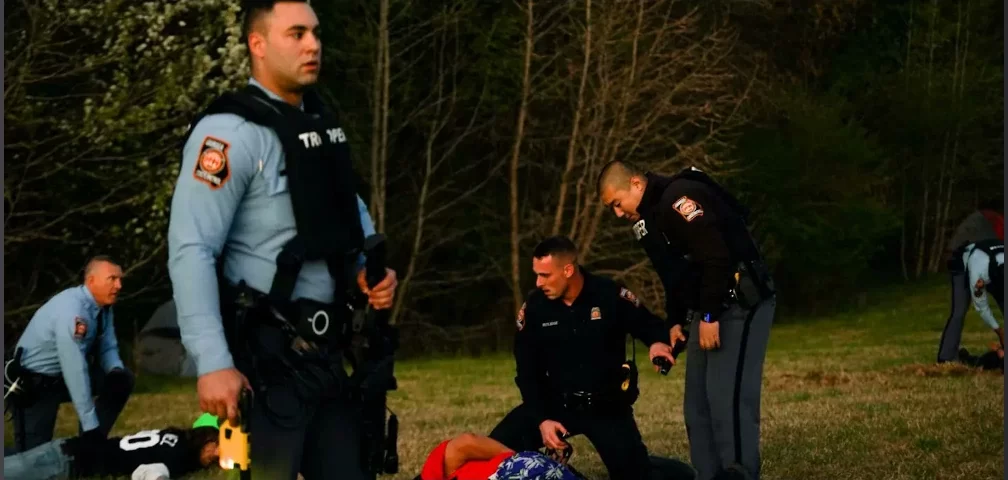News by People’s Dispatch, March 18, 2023
At least 23 protesters have been charged with domestic terrorism amid a week of action against the construction of “Cop City” in Atlanta, a proposed $90 million police training complex. Atlanta police detained 35 people and arrested 23 on the night of March 5, they claim, for vandalism against the Cop City construction site and violence towards police. Activists dispute this narrative. While video footage shows a small group torching the construction site and throwing fireworks towards police, according to activists, none of the 35 people detained were detained at the construction site itself. Earlier that day, demonstrators marched, and later attended a live music performance, as part of the larger week of action. Atlanta police detained protesters at these two events, activists report, which were both entirely peaceful.
Activists in Atlanta and across the country have for years opposed the construction of the Atlanta Public Safety Training Center, dubbed “Cop City”, which was deeply unpopular with residents since its first announcement in June 2021. The proposed training ground would cut down part of Atlanta’s South River Forest (also called the Welaunee Forest) to build, in part, a mock city for police across the nation to practice repression tactics. Activists have been occupying parts of the forest for over a year, which is where the live music performance on the night of March 5 took place.
Those fighting Cop City have now directed energy towards dropping charges against the 23 who were arrested and are facing hefty domestic terrorism charges. One of those arrested was a legal observer for the Southern Poverty Law Center.
This is not the first time that Cop City protesters have been charged with domestic terrorism. Police have slapped these massive charges on protesters following unrest as a response to the police killing of anti-Cop City activist Tortuguita, earlier in February. What is the legal basis for this? Georgia’s domestic terrorism law was passed in 2017 in part as a response to a mass shooting against Black churchgoers in South Carolina, carried out by white supremacist Dylann Roof. The law loosened the definition of “domestic terrorism” from an act intended to kill or injure at least ten people to any felony intended to “intimidate the civilian population” or “alter, change, or coerce the policy of the government.” Many at the time warned that this would be turned against left-wing protesters, rather than white supremacists—a prediction which proved accurate.
Georgia officials such as Governor Brian Kemp are doubling down on the domestic terrorism charges. “Domestic terrorism will NOT be tolerated in this state,” Kemp stated on March 6. “We will not rest until those who use violence and intimidation for an extremist end are brought to full justice.”
Activists and sympathetic press have turned their attention towards dispelling many prominent narratives against protesters, promoted by the right-wing and the mainstream media. One is the ever-pervasive “outside agitator” narrative, that has dogged recent and not-so-recent social movements against police violence, including the George Floyd protests in 2020. This narrative alleges that those behind such movements are not from the communities that they are protesting in, and are instead being sent in by shadowy or dangerous groups.
However, although all but two of the 23 charged with domestic terrorism are from outside of Georgia, activists accuse Atlanta police of strategically only arresting those who are from out of state to bolster the narrative. Police detained 35 but only arrested 23, and activists allege that those additional 12 people were weeded out because they were in fact from Atlanta.
“Simply because the police have chosen to systematically arrest people from out of state, doesn’t mean that what they’re saying is the truth,” said Reverend Keyanna Jones at an Atlanta interfaith clergy press conference on March 6, following the mass arrests. “I am a daughter of East Atlanta. I still live in East Atlanta. I don’t want Cop City,” Jones continued. “My granny owns a home that she’s been in for almost 50 years in the heart of East Atlanta Village. She does not want Cop City. My neighbor across the street does not want Cop City. The teachers at my daughter’s school do not want Cop City. And we are all from the community.”
The local organization Defend the Atlanta Forest emphasized, “It is not illegal to travel for a protest. It is not illegal to travel for a music festival.”
The Atlanta Police Department is also claiming that lethal violence came from protesters, not police, stating, “officers exercised restraint and used non-lethal enforcement to conduct arrests.” “The illegal actions of the agitators could have resulted in bodily harm,” APD stated. However, in one clip taken in the Welaunee Forest, an officer is heard announcing, “come forward with your hands up or you are going to get shot. I don’t know how else to put it, you’re going to get hit with a bullet.” Activists also claim to have heard police say, “I swear to God I will f-cking kill you” and claim that a state trooper pointed a gun into a children’s bouncy house.
Accusations against protesters made last week also echo the same accusations made by police against Tortuguita, who was murdered by Georgia state troopers on January 18. Police claim that Tortuguita fired first at officers, injuring one. However, recently revealed body camera footage heavily implies that this injured officer was shot, accidentally, by police themselves. “You f-cked your own officer up,” a police officer is heard mumbling following gunshots. Activists still demand that more footage be released regarding Tortuguita’s murder.
*Featured Image: Atlanta police arrest protesters in Welaunee Forest on the night of March 5 (Photo: Humanizing Through Story)
